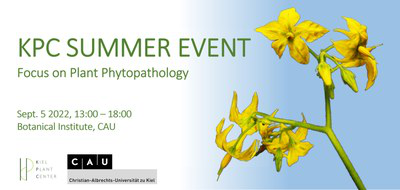Kiel Plant Center Summer Event
Date
Monday 5th of September 2022
Lecture Hall E62 at the Botanical Institute of Kiel University
Organizers
Prof. Dr. Eva H. Stukenbrock
Coordinator:
Dr. Rosemary Wilson
Organizers:
Dr. Anik Dutta
Dr. Danilo Pereira
Dr. Idalia Rojas
Program
Arrival / Welcome & Intro - Prof. Dr. Eva Stukenbrock, Christian-Albrechts-Universität zu Kiel, Germany
13:00 - 13:20
Septoria tritici, Mycosphaerella graminicola, Zymoseptoria tritici - 1990 – 2022 - Where do we come from, and where do we go? - Prof. Dr. Gert Kema, Wageningen University, Netherlands
13:20 - 14:00 Keynote
AVRa effectors – from recognition to virulence function(s) - Dr. Isabel Saur, University of Cologne, Germany
14:00 - 14:40 Keynote
The barley powdery mildew fungus Blumeria graminis f. sp. hordei (Bgh) relies on a huge repertoire of small secreted proteins (so-called effectors) for successful infection and the development of disease symptoms on the barley host. The Bgh AVRa effectors are recognized by intracellular barley immune receptors encoded at the Mildew locus A (MLAs) in resistant barley lines. Because such host immune receptors usually recognize crucial pathogen effectors inside the host cells, the Bgh AVRa effectors must play a major role in promoting fungal virulence on the barley host. MLAs also recognize effectors from other biotrophic fungal phytopathogens. The overlap of multiple biotrophs on MLA suggests that the Bgh AVRa effectors actually contribute to the establishment of the fungus' biotrophic lifestyle.
Host specificity defines a new fungal plant pathogen population - Wagner Fagundes, Christian-Albrechts-Universität zu Kiel, Germany
14:40 - 15:00
Break
15:00 - 15:20
Unravelling genetic mechanisms of agronomically important traits in quinoa (Chenopodium quinoa Willd.) - Dr. Nazgol Emrani, Christian-Albrechts-Universität zu Kiel, Germany
15:20 - 15:40
Species with different underground organs have distinct evolutionary and ecological patterns in Solanum - Dr. Edeline Gagnon, Christian-Albrechts-Universität zu Kiel, Germany
15:40 - 16:00
Intraspecific diversity in pathogen defence responses in a wild tomato species - Prof. Dr. Remco Stam, Christian-Albrechts-Universität zu Kiel, Germany
16:00 - 16:40 Keynote
Natural plant populations need to adapt to their local environment. What the implications are of such adaptations for the functioning of the pathogen defence signalling network is not known. We study the species-wide diversity in pathogen defence mechanisms in the wild tomato species: Solanum chilense. It grows in Chile and Peru and its specific demography, resulting from different expansions into new environments, allows us to learn how evolution of pathogen resistance properties happens in a natural context.
Closing words
16:40 - 17:00
Get-together and poster session in Mediterranean Greenhouse, Botanical Garden CAU
ca. 17:00 - ca. 18:00
Abstract submission
Complete your registration and then submit your abstract (250 words maximum) using the abstract submission link.
For posters we recommend using standard A0 size. Posters can be prepared starting at midday at the Mediterranean Greenhouse.
Contact
kielplantcenter@bot.uni-kiel.de

